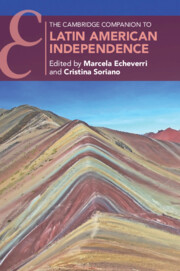Book contents
- The Cambridge Companion to Latin American Independence
- The Cambridge Companion to Latin American Independence
- Copyright page
- Dedication
- Contents
- Figures
- Maps
- Contributors
- Acknowledgments
- Maps
- Introduction
- 1 On the Origins of Latin American Independence
- 2 Constitutionalism and Representation in Ibero-America during the Independence Processes
- 3 Foreign Interaction and the Independence of Latin America
- 4 Public Opinion and Militarization during the Wars of Independence
- 5 Natural Histories of Remembrance and Forgetting
- 6 Brothers in Arms
- 7 Beyond Heroes and Heroines
- 8 Views of the Latin American Independences from the Iberian Peninsula
- 9 Shades of Unfreedom
- 10 Early Liberalism
- Bibliography
- Index
5 - Natural Histories of Remembrance and Forgetting
Science and Independence in the Spanish and Portuguese Americas
Published online by Cambridge University Press: 16 March 2023
- The Cambridge Companion to Latin American Independence
- The Cambridge Companion to Latin American Independence
- Copyright page
- Dedication
- Contents
- Figures
- Maps
- Contributors
- Acknowledgments
- Maps
- Introduction
- 1 On the Origins of Latin American Independence
- 2 Constitutionalism and Representation in Ibero-America during the Independence Processes
- 3 Foreign Interaction and the Independence of Latin America
- 4 Public Opinion and Militarization during the Wars of Independence
- 5 Natural Histories of Remembrance and Forgetting
- 6 Brothers in Arms
- 7 Beyond Heroes and Heroines
- 8 Views of the Latin American Independences from the Iberian Peninsula
- 9 Shades of Unfreedom
- 10 Early Liberalism
- Bibliography
- Index
Summary
While the conventional understanding within many Latin American historiographical traditions is that science went hand in hand with political liberation from the metropole, this chapter seeks to elucidate the ways in which the public sphere in both Spanish America and Brazil cultivated very different narratives and historiographies. In Spanish America, the republican public sphere aggressively set out to erase all connections between Spain, monarchy, and empire. Science became antithetical with the Spanish empire. The erase was deliberate and painstaking, a careful process of both forgetting and ignoring. By the time national historiographies emerged, the idea of revolution, republic patriotism, and science as casually connected became inextricably linked. In Brazil, there was a different process of forgetting. Science, empire, and monarchy never became disconnected and antithetical in the same fashion, dependent as science was on monarchical institutions that had arrived with the Portuguese royal family in 1808 Brazil. Yet the meaning of science did take a strange turn as science became, in print, the handmaiden of industry in a society that continued to witness a significant expansion of plantation slavery and the slave trade well into the nineteenth century.
Keywords
- Type
- Chapter
- Information
- The Cambridge Companion to Latin American Independence , pp. 153 - 185Publisher: Cambridge University PressPrint publication year: 2023
- 1
- Cited by

